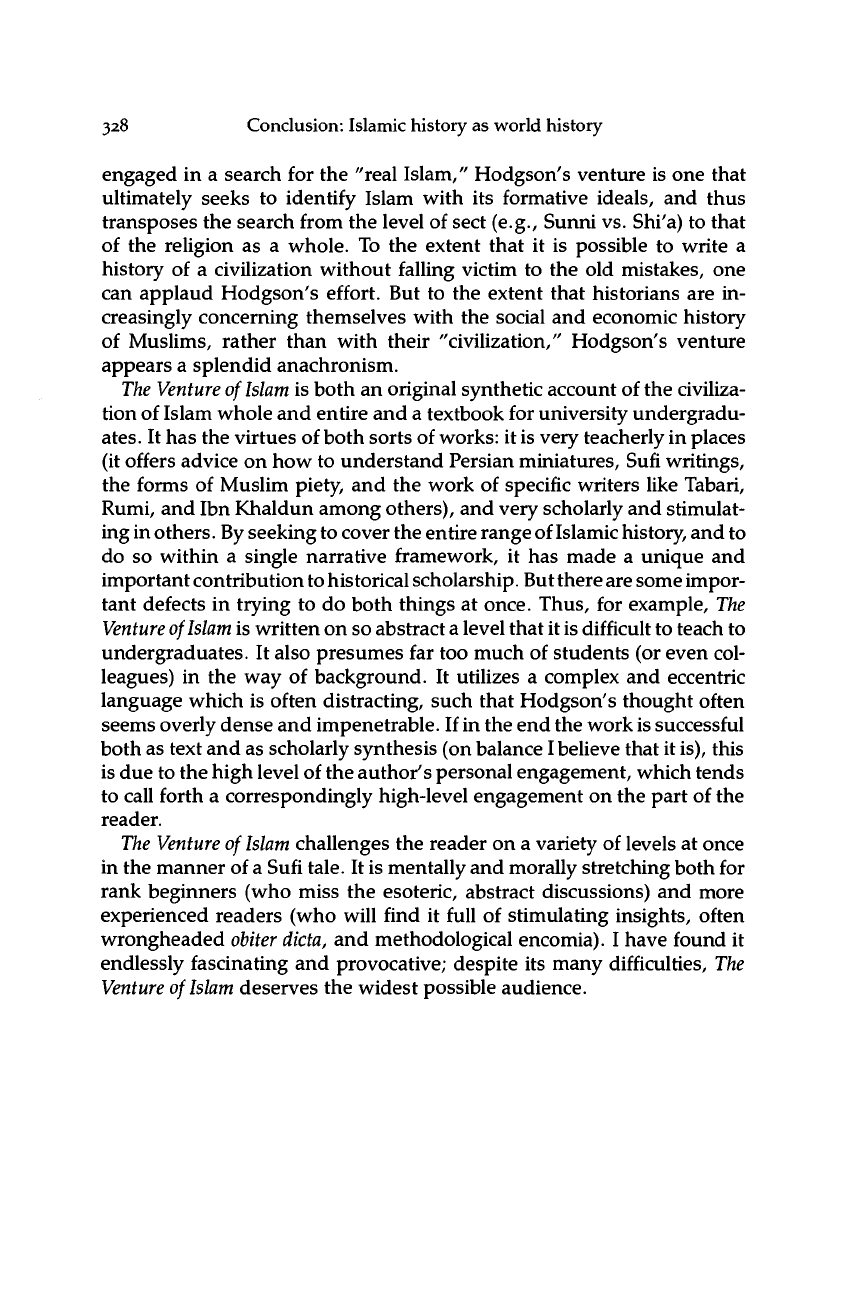Marshall Hodgson. Rethinking World History: Essays on Europe, Islam and World History
Подождите немного. Документ загружается.


Conclusion: Islamic history as world history 327
Conclusion
As should be evident from the foregoing,
I
regard
The Venture
of
Islam
as a
remarkably impressive achievement. It has a richness and complexity
beside which all other accounts of Islamic civilization seem pale. In many
ways,
its appearance represents a culmination of the Western tradition of
Islamic studies. Necessarily, such an undertaking must be a highly per-
sonal one, and this
The Venture
of
Islam
is to an unusual degree.
Yet
Hodg-
son was also unusually self-conscious of the epistemological assumptions
of the tradition in which he had been trained, and has consistently sought
to place Islamic civilization in a world historical context.
It is
this feature
of
the work, in my opinion, which gives it lasting importance. Otherwise the
cranky personal obsessions that frequently threaten to distract the reader
could not be kept successfully at bay. Because
The
Venture of
Islam is
both so
personal and so relentlessly impersonal
a
work, it
is a
very great feat of the
historical imagination.
Hodgson's most important achievement, and the place where he had
the most to teach us all (non-Islamics scholars included), lies in his effort
to devise a new framework for the writing of world history. After read-
ing him, even those of us who never attempt a hemispheric interregional
approach to world history will become aware of the pitfalls of any less
inclusive approach; his
Venture
points to the necessity for a thorough-
going reappraisal of many of our central assumptions about the histori-
cal process. By continually seeking to insert the story of Islamic civiliza-
tion into the history of human literate society, Hodgson has broken
sharply with the old paradigms and taken a major step toward a new
kind of history. His use of ideal types and his careful definition of key
concepts provide a refreshing change from the smug assumptions that
have guided past efforts at a history of Islamic civilization. The attempt
to situate the rise of the West in a world historical context, in particular,
merits the serious attention of all those concerned to understand the
great transmutation which separates us from the world we have lost.
Hodgson's attempt to rehabilitate civilization as a useful concept in
historical studies (and hence in the orientalist tradition) is more problem-
atical. As I have endeavored to show, the attempt rests, in the final
analysis, on Hodgson's use of the concept of sharia. Despite a serious
effort to divest the study of civilizations from racialist assumptions, hy-
postatizing, and other errors, the idealist assumptions which lie behind
the concept of sharia push him irrevocably toward cultural essentialism
and thereby vitiate much of his achievement. While denying that he is

328 Conclusion: Islamic history as world history
engaged in a search for the "real Islam," Hodgson's venture is one that
ultimately seeks to identify Islam with its formative ideals, and thus
transposes the search from the level of sect (e.g., Sunni vs. Shi'a) to that
of the religion as a whole. To the extent that it is possible to write a
history of a civilization without falling victim to the old mistakes, one
can applaud Hodgson's effort. But to the extent that historians are in-
creasingly concerning themselves with the social and economic history
of Muslims, rather than with their "civilization," Hodgson's venture
appears a splendid anachronism.
The Venture of
Islam
is both an original synthetic account of the civiliza-
tion of Islam whole and entire and a textbook for university undergradu-
ates.
It has the virtues of both sorts of works: it is very teacherly in places
(it offers advice on how to understand Persian miniatures, Sufi writings,
the forms of Muslim piety, and the work of specific writers like Tabari,
Rumi, and Ibn Khaldun among others), and very scholarly and stimulat-
ing in others. By seeking to cover the entire range of Islamic history, and to
do so within a single narrative framework, it has made a unique and
important contribution to historical scholarship. But there are some impor-
tant defects in trying to do both things at once. Thus, for example, The
Venture of Islam is written on so abstract a level that it is difficult to teach to
undergraduates. It also presumes far too much of students (or even col-
leagues) in the way of background. It utilizes a complex and eccentric
language which is often distracting, such that Hodgson's thought often
seems overly dense and impenetrable. If in the end the work is successful
both as text and as scholarly synthesis (on balance I believe that it is), this
is due to the high level of the author's personal engagement, which tends
to call forth a correspondingly high-level engagement on the part of the
reader.
The Venture of Islam challenges the reader on a variety of levels at once
in the manner of a Sufi tale. It is mentally and morally stretching both for
rank beginners (who miss the esoteric, abstract discussions) and more
experienced readers (who will find it full of stimulating insights, often
wrongheaded obiter dicta, and methodological encomia). I have found it
endlessly fascinating and provocative; despite its many difficulties, The
Venture of
Islam
deserves the widest possible audience.
